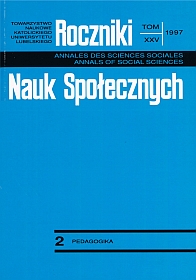Pedagogika dorosłych: od funkcji kompensacyjnej do funkcji właściwej
Abstrakt
The genesis of adult education in Europe reaches back to the second half of the 18th century. It was then that alongside the development of industry appeared a necessity to teach factory workers to read and write. Most of them were illiterate peasants. An interest would arise among workers to gain some basic knowledge about natural sciences, technique, economics, history, and hygiene. The peasants, sunk in illiteracy, gradually began to feel educational needs, which made them undertake ever new initiative in this regard.
In Poland, partitioned among the three dividing parties in the 19th century, the satisfaction of educational needs of the impaired strata was additionally made difficult by the invaders who made it impossible to teach in Polish. Educational initiatives would take on a character of selfeducation. The latter was also pursued by secondary school pupils, students and women, mainly home teachers, deprived of an access to universities. All the above mentioned forms of adult education had a compensatory character, i.e. they replaced school education, which these people lacked during childhood and adolescence.
Now the function of adult education has changed. In view of the obligatory character of education, encompassing obligatory education of all children and adolescents on the elementary level and in some countries also on the secondary level, adult education fulfills its proper function, i.e. satisfies various educational and cultural needs of adults. Thus it has become an integral part of educational systems. This is in accord with the idea of permanent education, formulated and popularized within the frameworks of UNESCO in the second half of the 20th century.
Bibliografia
Deklaracja o wychowaniu chrześcijańskim „Gravissimum educationis”, Sobór Watykański II Konstytucje − dekrety − deklaracje, Poznań 19863.
Jan Paweł II: Orędzie na Wielki Post 1995 r., „L’Osservatore Romano”, wyd. polskie 1995, nr 3, s. 4-5.
Kościół a kultura masowa. Wybór tekstów i oprac. F. Adamski, Kraków 1984.
Lepa A., bp: S´ wiat propagandy, Częstochowa 1994, „Niedziela” 7.
Lepa A., bp: S´ wiat manipulacji, Częstochowa 1995, „Niedziela” 18.
Paweł VI: Encyklika o popieraniu rozwoju ludów „Populorum progressio”, Paris 1968 Éditions du Dialogue.
Pawlina K., ks.: Nowa ewangelizacja i jej realizacja w Polsce po 1989 roku, Warszawa 1995.
Półturzycki J.: Dydaktyka dorosłych, Warszawa 1991.
Prasa, radio, telewizja, film w nauczaniu Kościoła. Antologia tekstów źródłowych, wybór i oprac. K. Klauza, Warszawa 1992. Katolickie Stowarzyszenie Dziennikarzy.
Wprowadzenie do andragogiki. Praca zbiorowa pod red. T. Wujka, Warszawa 1996.
Copyright (c) 1997 Roczniki Nauk Społecznych

Utwór dostępny jest na licencji Creative Commons Uznanie autorstwa – Użycie niekomercyjne – Bez utworów zależnych 4.0 Międzynarodowe.


